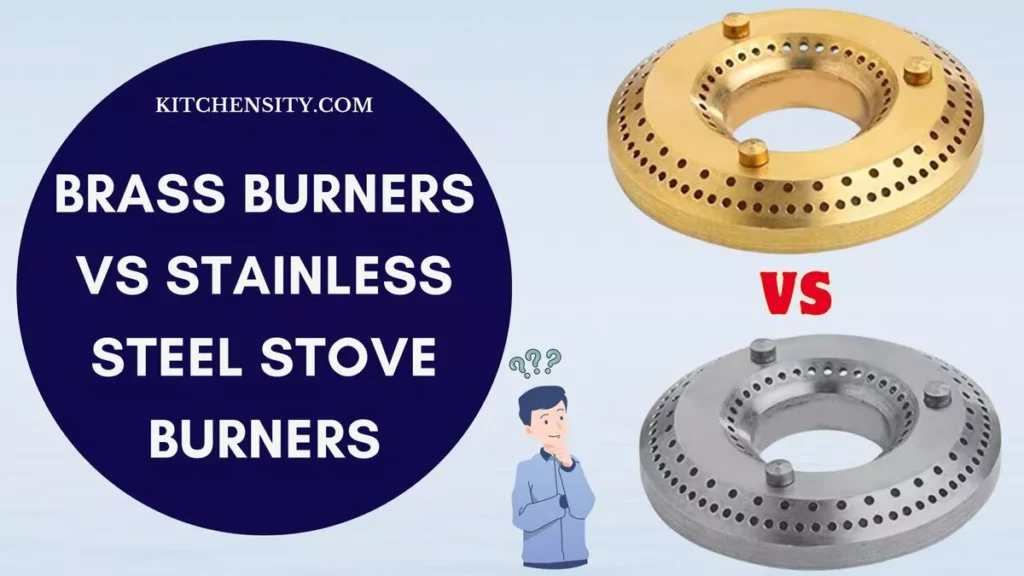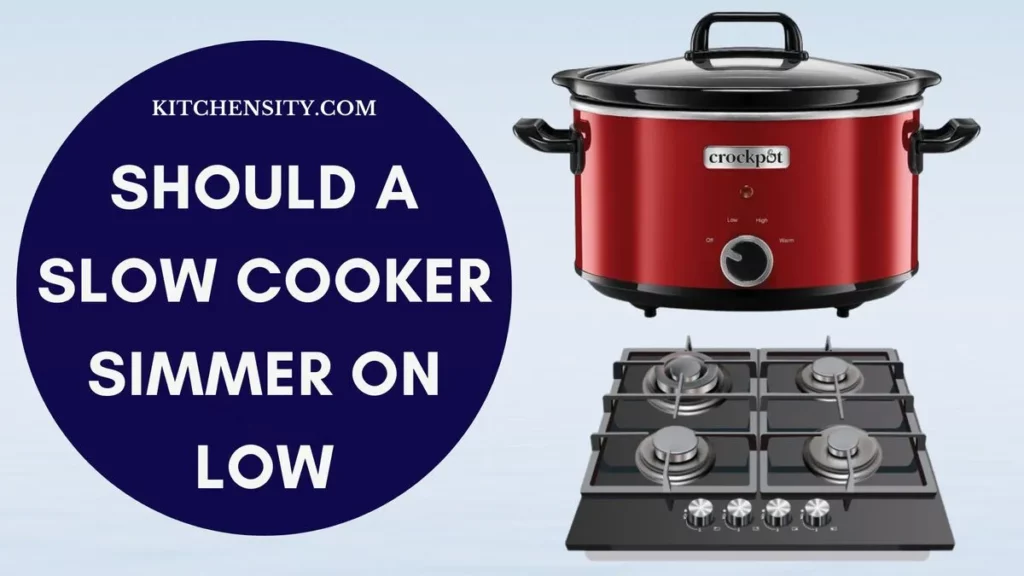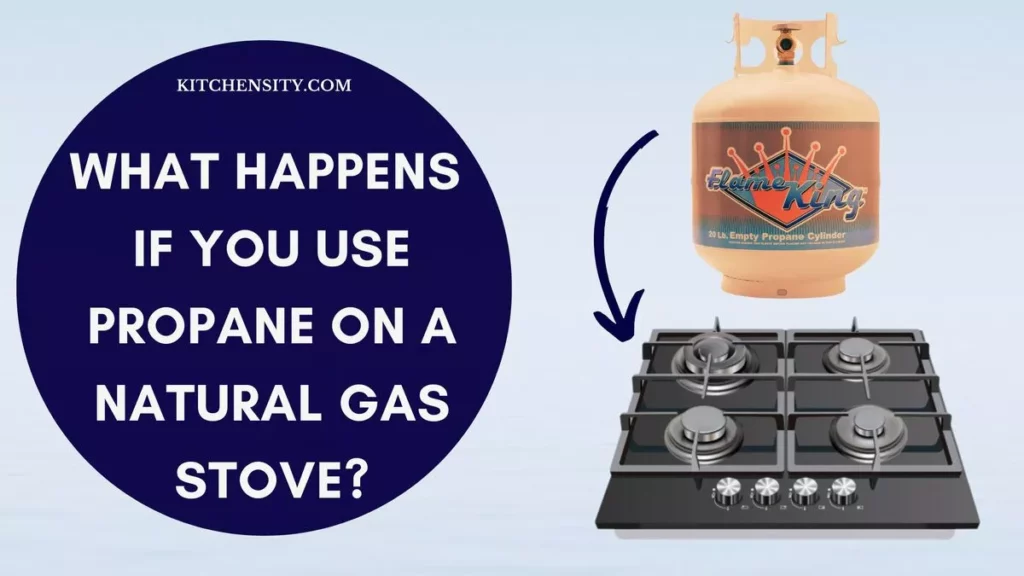When it comes to selecting the right stove burners for your kitchen, the choice between brass burners vs stainless steel stove burners can be confusing. Both materials come with their unique set of advantages and limitations.
In this article, we will delve into the intricacies of both brass and stainless steel stove burners, providing you with a comprehensive comparison to help you make an informed decision.

Table of Contents
- 1 Brass Burners Vs Stainless Steel Stove Burners
- 2 Understanding Brass Burners
- 3 Stainless Steel Stove Burners: An Overview
- 4 Brass Burners Vs Stainless Steel Stove Burners: A Comparative Analysis
- 5 Factors to Consider When Choosing Between Brass and Stainless Steel Burners
- 6 Which Burner Is Good For The Gas Stove?
- 7 Does Brass Last Longer Than Stainless Steel?
- 8 Maintenance And Cleaning Comparison
- 9 Final Thoughts
- 10 Frequently Asked Questions (FAQs)
Brass Burners Vs Stainless Steel Stove Burners
Brass burners offer superior heat conductivity and a traditional charm but require regular maintenance. Stainless steel burners provide durability, easy maintenance, and modern aesthetics, making them a practical and stylish choice for many households.
The choice between Brass Burners and Stainless Steel Stove Burners depends on individual preferences.
Also Read – Brass Burners Vs Cast Iron Burners
Comparison Table
| Criteria | Brass Burners | Stainless Steel Burners |
| Heat Conductivity | Excellent heat conductivity ensures even cooking and precise temperature control. | Slightly lower heat conductivity may result in uneven cooking, especially with lower-quality cookware. |
| Durability and Resistance | Highly durable, resistant to corrosion, and requires regular polishing to maintain appearance. | Corrosion-resistant, durable, maintains integrity at high temperatures, minimal maintenance required. |
| Cost and Budget | More expensive upfront due to superior quality and heat conductivity. | Budget-friendly option, providing reliable performance without a hefty price tag. |
| Aesthetic Appeal | Traditional and elegant, adds warmth with a golden hue. | Modern and sleek, fits seamlessly into contemporary kitchen designs. |
| Maintenance | Regular polishing is required to maintain shine and prevent tarnishing. | Easy to clean, minimal maintenance, no frequent polishing needed. |
Understanding Brass Burners
Brass burners are like the superheroes of your kitchen stove. Imagine them as the conductors of heat, ensuring your food cooks perfectly every time. What makes them special is their ability to spread heat evenly across your pots and pans. So, no more worrying about one part of your dish burning while the other stays undercooked!
Not just that, these burners are tough cookies. They can handle high temperatures without losing their strength, making them last a long, long time. Plus, they respond quickly when you adjust the heat, giving you precise control over your cooking. And the best part? They don’t easily get ruined by spills and splatters, thanks to their natural resistance to rust and corrosion. So, when you have a brass burner in your kitchen, you know you’ve got a reliable partner for all your cooking adventures!
Also Read – Butane Vs Propane Stove
Advantages Of Brass Burners
Brass burners bring many benefits to your kitchen, making them a popular choice among chefs and home cooks alike.
- Even Heat Distribution: One of the standout advantages of brass burners is their exceptional ability to distribute heat evenly. This means your food cooks uniformly without any hot spots, ensuring that every bite is perfectly cooked.
- Precision Cooking: Brass burners respond swiftly to changes in temperature settings, providing precise control over your cooking. Whether you’re simmering delicate sauces or searing meats, you can adjust the heat with accuracy, allowing for culinary creations that are just right every time.
- Durability And Longevity: Built to last, brass burners are incredibly durable. They can withstand high temperatures and the wear and tear of daily cooking without losing their efficiency. This durability translates to a longer lifespan for your stove, offering excellent value for your investment.
- Resistance To Corrosion: Brass has a natural corrosion resistance, making the burners resilient against moisture and spills. This resistance ensures that your brass burners maintain their quality over time, requiring minimal maintenance and providing consistent performance.
- Enhanced Cooking Experience: The combination of even heat distribution, precision cooking, durability, and corrosion resistance elevates your overall cooking experience. Whether you’re a professional chef in a bustling restaurant or a home cook preparing family meals, brass burners enhance the joy of cooking, making every dish a culinary masterpiece.
Also Read – Can You Paint Gas Stove Grates?
Limitations Of Brass Burners
While brass burners offer many advantages, they do come with a few limitations that are worth considering:
- Regular Maintenance Required: To keep their shine and performance, brass burners require regular polishing. Without proper maintenance, they can tarnish over time, affecting both their appearance and functionality. This upkeep can be time-consuming for individuals seeking low-maintenance kitchen appliances.
- Initial Cost: Compared to some other burner materials, brass burners can have a higher initial cost. This might pose a challenge for budget-conscious consumers looking for cost-effective kitchen solutions. While the long-term benefits justify the investment, the upfront expense can be a limiting factor for some buyers.
- Limited Compatibility: Brass burners are not compatible with induction cooktops due to their non-magnetic nature. If you plan to switch to an induction cooktop in the future, this limitation might influence your decision, especially if you’re aiming for a seamless transition between appliances.
- Weight: Brass burners are generally heavier than burners made from other materials. While this weight contributes to their durability, it can be a drawback if you need to move or clean your stove frequently. Handling heavy burners might be challenging for some individuals, making the cleaning process less convenient.
Also Read – How To Clean Electric Stove Burners And Drip Pans?
Stainless Steel Stove Burners: An Overview
Stainless steel stove burners are celebrated for their modern aesthetic and robust build. They might look sleek, but they’re tough and incredibly practical. What makes them amazing is their ability to resist rust and stains, making them a durable choice for busy kitchens where spills are bound to happen. So, even after countless cooking adventures, they keep shining bright without much effort from your end.
Not just that, these burners are a breeze to clean. A simple wipe with a damp cloth and they’re back to looking brand new. Plus, they can handle high temperatures like pros, ensuring your cooking experiments never go awry. And let’s not forget their versatility; whether you’re using lightweight pans or heavy-duty skillets, these burners ensure your food is cooked just right. So, when you choose stainless steel burners, you’re not just opting for functionality, you’re adding a touch of modern elegance to your kitchen too!
Also Read – Can You Replace Burners On An Electric Stove?
Advantages Of Stainless Steel Stove Burners
Stainless steel stove burners offer a range of benefits that make them a popular choice for kitchens worldwide.
- Corrosion Resistance: Stainless steel burners are highly resistant to corrosion and rust, making them incredibly durable. This resistance ensures that your burners maintain their appearance and performance over time, even in environments prone to moisture and spills.
- Easy Maintenance: One of the standout advantages of stainless steel burners is their easy maintenance. They are simple to clean and require minimal effort to keep them looking brand new. A quick wipe with a damp cloth is often all it takes to remove stains and spills, saving you time and energy in your kitchen cleanup routine.
- Modern Aesthetics: Stainless steel burners add a touch of modern elegance to any kitchen. Their sleek and reflective surface enhances the overall aesthetic, making them a perfect fit for contemporary kitchen designs. Whether you have a minimalist or industrial-style kitchen, stainless steel burners seamlessly blend in, elevating the visual appeal of your cooking space.
- High-Temperature Tolerance: Stainless steel burners can withstand high cooking temperatures without warping or losing their structural integrity. This heat tolerance ensures that your burners remain reliable and functional, even during intense cooking sessions, providing consistent heat for your culinary creations.
- Versatility And Compatibility: Stainless steel burners are versatile and compatible with various cookware materials. Whether you’re using non-stick pans, cast-iron skillets, or stainless steel pots, these burners ensure even heat distribution, allowing you to experiment with diverse cooking techniques and recipes.
Also Read – How To Clean Gas Stove Grates?
Limitations Of Stainless Steel Stove Burners
While stainless steel stove burners come with various advantages, there are a few limitations to consider:
- Heat Conductivity: Compared to some other materials, stainless steel has slightly lower heat conductivity. This can result in uneven cooking, especially if the pan or pot is not of high quality. While stainless steel burners can handle high temperatures, achieving precise heat control might be challenging for certain recipes.
- Initial Cost: Stainless steel stove burners can be relatively expensive upfront compared to burners made from other materials. For budget-conscious consumers, this initial cost might be a limiting factor, although the long-term durability and low maintenance costs often justify the investment.
- Scratches And Dents: Stainless steel, while resistant to corrosion, is susceptible to scratches and dents, especially when exposed to sharp or heavy utensils. While these marks don’t usually affect the functionality of the burners, they can impact the visual appeal, which might be a concern for individuals who prioritize the aesthetic of their kitchen appliances.
- Fingerprints And Smudges: Stainless steel surfaces are prone to showing fingerprints and smudges, requiring frequent cleaning to maintain their polished appearance. This can be a hassle for individuals who prefer appliances with a consistently spotless look, as it demands regular attention to keep the burners looking clean and shiny.
- Limited Compatibility With Induction Cooktops: While stainless steel is a popular material for stovetop burners, not all stainless steel cookware is compatible with induction cooktops. This limitation might affect individuals who plan to switch to induction cooking in the future, as they would need to invest in specific induction-compatible cookware.
Also Read – Do Electric Stoves Use Gas?
Brass Burners Vs Stainless Steel Stove Burners: A Comparative Analysis
When it comes to selecting the perfect stove burners for your kitchen, understanding the differences between brass burners and stainless steel stove burners is crucial. Let’s break down the comparative analysis to help you make an informed decision.
- Heat Conductivity: Brass Burners: Brass burners excel in heat conductivity, distributing heat evenly across your cookware. This even distribution ensures uniform cooking, ideal for delicate dishes that require precise temperature control. Stainless Steel Burners: While stainless steel burners are durable, they have slightly lower heat conductivity than brass. This may result in uneven cooking, especially with lower-quality cookware.
- Durability And Resistance: Brass Burners: Brass is highly durable and resistant to corrosion, offering a long lifespan for your stove. However, regular polishing is necessary to maintain its appearance. Stainless Steel Burners: Stainless steel burners are corrosion-resistant and durable, capable of withstanding high temperatures without losing their integrity. They are also easier to maintain, requiring simple cleaning without the need for frequent polishing.
- Cost And Budget: Brass Burners: Brass burners are often more expensive initially due to their superior heat conductivity and premium quality. Stainless Steel Burners: Stainless steel burners are more budget-friendly, making them a practical choice for those looking for reliable performance without breaking the bank.
- Aesthetic Appeal: Brass Burners: Brass burners add a touch of traditional elegance to your kitchen, with their warm, golden hue enhancing the overall aesthetic. Stainless Steel Burners: Stainless steel burners offer a modern and sleek appearance, fitting seamlessly into contemporary kitchen designs.
- Maintenance: Brass Burners: Brass burners require regular polishing to maintain their shine and prevent tarnishing. Stainless Steel Burners: Stainless steel burners are easy to clean and do not require frequent polishing, saving time and effort in maintenance.
So, the choice between brass burners and stainless steel stove burners depends on your priorities. If you value superior heat conductivity and don’t mind regular maintenance, brass burners might be the ideal choice. However, if durability, budget-friendliness, and low maintenance are your key factors, stainless steel stove burners offer a practical and stylish solution for your kitchen needs.
Also Read – Are Electric Stove Burners Interchangeable?
Factors to Consider When Choosing Between Brass and Stainless Steel Burners
Choosing between brass and stainless steel burners involves considering several key factors to ensure your kitchen appliances align with your needs and preferences.
- Cooking Style And Precision: Consider your cooking style. If you require precise temperature control and even heat distribution for delicate recipes, brass burners are ideal due to their superior heat conductivity. However, if your cooking involves a variety of dishes and you value durability, stainless steel burners might be a better fit.
- Budget And Cost: Evaluate your budget constraints. Brass burners tend to be more expensive upfront due to their high-quality construction and heat conductivity. If you are looking for a cost-effective option without compromising on performance, stainless steel burners offer a reliable solution.
- Maintenance And Cleaning: Think about the level of maintenance you are willing to invest in. Brass burners require regular polishing to maintain their appearance, while stainless steel burners are easy to clean and do not demand frequent polishing. If you prefer low-maintenance appliances, stainless steel might be the more practical choice.
- Kitchen Aesthetics: Consider the overall design and aesthetics of your kitchen. Brass burners add a touch of traditional elegance with their warm golden hue, making them suitable for classic kitchen styles. In contrast, stainless steel burners offer a modern and sleek appearance, complementing contemporary and minimalist kitchen designs.
- Compatibility With Cookware: Check the compatibility of the burners with your existing cookware. Stainless steel burners are versatile and compatible with various cookware materials, ensuring even heat distribution. Brass burners, while exceptional in heat conductivity, might require specific cookware to maximize their performance.
By weighing these factors according to your requirements, you can make an informed decision between brass and stainless steel burners, ensuring your kitchen appliances cater to your cooking preferences and lifestyle.
Also Read – How Long Can You Leave An Electric Stove On Without Risking A Fire?
Which Burner Is Good For The Gas Stove?
Both brass and stainless steel burners are suitable for gas stoves, and the choice depends on your specific needs and preferences.
- Brass Burners: Brass burners are excellent for gas stoves due to their exceptional heat conductivity. They distribute heat evenly across the cookware, providing precise temperature control. If you are a cooking enthusiast or a professional chef who values precise cooking and even heat distribution, brass burners are an excellent choice for your gas stove.
- Stainless Steel Burners: Stainless steel burners are also suitable for gas stoves and offer several advantages. They are corrosion-resistant, durable, and easy to clean, making them a practical option for everyday cooking. If you prioritize low maintenance, durability, and a modern look for your kitchen, stainless steel burners are a good fit for your gas stove.
Ultimately, both types of burners can work well with gas stoves. Consider factors such as heat conductivity, maintenance requirements, budget, and aesthetic preferences to determine which burner material aligns best with your cooking style and kitchen needs.
Also Read – Why Electric Stoves Take Forever To Boil Water?
Does Brass Last Longer Than Stainless Steel?
The longevity of both brass and stainless steel depends on various factors, and neither material inherently outlasts the other in all situations.
While both materials are durable, stainless steel has a slight edge in terms of longevity due to its resistance to corrosion and minimal maintenance requirements. Stainless steel burners tend to maintain their appearance and structural integrity over a more extended period compared to brass burners, especially in environments with varying humidity levels or exposure to acidic substances.
However, it’s essential to note that the lifespan of both materials heavily depends on proper care and maintenance. Regular cleaning, avoiding harsh chemicals, and promptly wiping off spills can significantly extend the life of either brass or stainless steel burners. Therefore, while stainless steel might have a slight advantage in terms of longevity due to its corrosion resistance, both materials can last a long time if well-maintained. Ultimately, the choice between brass and stainless steel should consider factors such as maintenance preferences, budget, and specific use cases to ensure the longevity of your kitchen appliances.
Also Read – How Hot Do Electric Stove Burners Get?
Maintenance And Cleaning Comparison
When it comes to maintenance and cleaning, stainless steel burners have a clear advantage over brass burners.
- Brass Burners: Brass burners require regular polishing to maintain their shine and prevent tarnishing. They are more susceptible to discoloration and need careful handling to avoid scratches, ensuring their longevity. Cleaning brass burners demands attention to detail and specific cleaning agents to preserve their appearance.
- Stainless Steel Burners: Stainless steel burners are easy to clean and maintain. They do not require frequent polishing and can be wiped clean with a damp cloth. Stainless steel is naturally resistant to stains and rust, making the cleaning process hassle-free. Their durability allows for the use of regular cleaning agents without the risk of damage, ensuring a spotless and gleaming surface with minimal effort.
So, stainless steel burners offer a convenient and low-maintenance solution. Their resistance to stains and ease of cleaning make them an excellent choice for individuals seeking efficient and straightforward upkeep for their kitchen appliances.
Also Read – How To Simmer On An Electric Stove?
Cleaning Comparison: Brass Vs Stainless Steel Stove Burners
| Aspect | Brass Burners | Stainless Steel Burners |
| Polishing Frequency | Regular polishing required to maintain shine and prevent tarnishing. | No frequent polishing is needed, retains shine with minimal effort. |
| Susceptibility to Stains | More susceptible to discoloration and stains, demanding careful handling. | Naturally resistant to stains and rust, making them easier to clean. |
| Cleaning Agents | Requires specific cleaning agents and meticulous cleaning due to sensitivity. | Can be cleaned with regular agents, allowing for convenient and hassle-free cleaning. |
| Scratch Resistance | Prone to scratches, requiring gentle handling to avoid surface damage. | More scratch-resistant, allowing for regular cleaning without the risk of visible marks. |
| Overall Maintenance Effort | Demands meticulous care and attention, involving more effort in maintenance. | Offers a lower maintenance effort, providing a convenient cleaning experience. |
Also Read – Best Cookware For Electric Stoves
Final Thoughts
In the battle of Brass Burners Vs Stainless Steel Stove Burners, there’s no definitive winner; it all boils down to your specific needs and preferences. If you’re an enthusiast seeking precise cooking control and don’t mind regular maintenance, brass burners shine with their exceptional heat conductivity and traditional charm. However, if you prioritize durability, low maintenance, and modern aesthetics, stainless steel stove burners offer a sleek and practical solution.
Consider your cooking style, budget, and maintenance preferences. Brass burners impress with their even heat distribution and responsiveness, making them a favorite in professional kitchens. On the other hand, stainless steel burners, with their resistance to corrosion, easy maintenance, and versatility, cater to practicality and contemporary design.
Ultimately, the choice is yours. Whether you opt for the timeless elegance of brass or the sleek efficiency of stainless steel, both options guarantee a reliable and enjoyable cooking experience. So, assess your needs, weigh the pros and cons, and make the decision that transforms your kitchen into a culinary haven tailored to your tastes and lifestyle.
Also Read – What Temperature Is Simmer On An Electric Stove?
Frequently Asked Questions (FAQs)
-
Are Brass Burners Better?
There isn’t a definitive “better” when it comes to brass or stainless steel burners; it depends on individual preferences and specific needs. Both materials have their advantages and limitations, making them suitable for different situations.
-
Which Burner Material Is More Energy-Efficient?
Both brass and stainless steel burners are highly energy-efficient, ensuring optimal heat distribution and utilization.
-
Do Stainless Steel Burners Rust Over Time?
Stainless steel burners are highly resistant to rust and corrosion, maintaining their quality over the years.
-
Can Brass Burners Withstand High Temperatures?
Yes, brass burners can withstand high cooking temperatures, making them suitable for various cooking methods.
-
Which Burner Material Is More Popular In Professional Kitchens?
Brass burners are favored in professional kitchens for their exceptional heat conductivity and precise cooking control.
🔧 Stove Expert | 🔥 Gas Guru | 🏠 DIY Enthusiast | 🎨 Painter Extraordinaire
John Davis is your go-to source for all things stoves, from expert repairs to maintenance tips. With a deep understanding of gas systems, including natural and propane, John ensures your kitchen stays cooking safely. His passion for DIY home and kitchen projects shines through his stunning paint transformations. Trust John to bring warmth and functionality to your home, one stove at a time.







